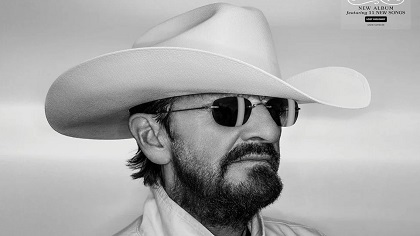
![]()
Ringo Starr – Look Up – Review by Eoin Glackin
3/5
Ringo Starr’s love for country music has never been a secret. On only his second solo album, 1970’s country fuelled “Beaucoups of Blues,” he took the opportunity to channel the passion previously hinted at in his time with The Beatles - his self-penned “Don’t Pass Me By,” from the White Album a case in point.)
This is indeed a country album, undoubtedly. However, a good part of the country identity of some of these songs comes via the guest musicians or the steel-guitar embellishments, rather than the songwriting itself. Opener “Breathless” is raised from an unremarkable rockabilly tribute to something higher thanks to the bluegrass-coloured fretwork of guest Billy Strings.
“Come Back,” a personal highlight, is traditional country to its very core. Based around a classic dobro riff and decorated with backing vocals that came straight from the 1950s, courtesy of guests, indie-country-pop duo, Lucius.
The album always sounds rich, perfectly textured thanks to the steady hand and ears of T-Bone Burnett (Daniel Tashian and Bruce Sugar also co-produce.) In fact, T-Bone is an inescapable force on this album, far beyond the producer’s chair, as he also wrote or co-wrote the bulk of the songs.
T-Bone was initially challenged by Starr to write him a song for an EP he was working on, after which the 12-time Grammy winning producer, musician and songsmith wrote nine country-tinged pieces for The Beatles icon. So, this project was born.
The bould Richard Starkey plays drums on all but one song, and if someone told me there was a country album, by anyone, that Ringo plays drums on, I’d probably have a curious listen for that alone. I was sure on one of my playthroughs to focus my ears on his drumming, and bygod, it’s unmistakably yer man from the Fabs alright.
It is however the lyrics where this album falls down. I wasn’t expecting Kristofferson-level subtle narratives about the dread in facing another day on earth without the one thing you need, but this often becomes relentless to the extreme in its inoffensiveness.
Lines like “I will never leave you lonely, I will be your one and only,” from “Can You Hear Me Call” are symptomatic of the general lyrical insipidness. The duet element with Molly Tuttle on that particular tune brings an identity it would otherwise lack.
The repetitive AABB structure of the short-and-snappy lines across the album seems to reinforce the irritating blandness of their content.
“Rosetta” makes a welcome turn into swamp territory, and freshens up the palate at the right time. The at-times-frantic lead guitar of Billy Strings pushes through right at the sweet spots. I didn’t come into this looking for a Beatles-esque moment, but this gives the most obvious hint in that direction. Larkin Poe are also used to great, hooky effect on backing vocals here.
For the album to bear a song called “String Theory” and not feature the recurring guest Billy Strings seems like a wasted opportunity. Maybe they felt they’d used up all of their obvious choices on the lyrics.
The last song, “Thankful” (featuring Alison Krauss) is notable for being the only song where Starkey has a writing credit. As the closer to an album by an 84-year-old walking legend of modern culture, it’s hard to be cynical about the simple directness of him telling us how grateful he is for it all.
We’re thankful too, Ringo.